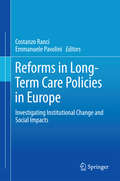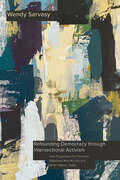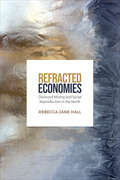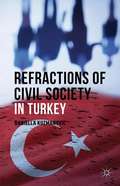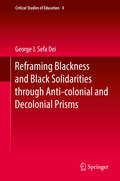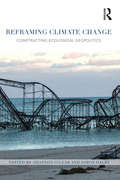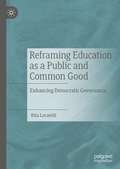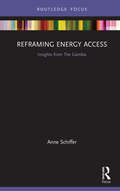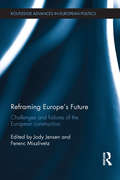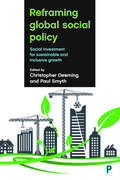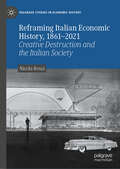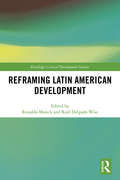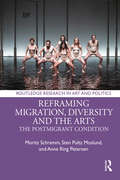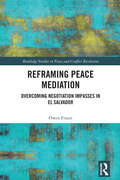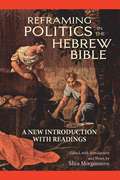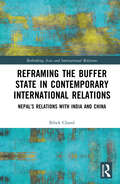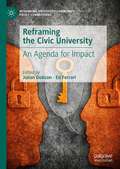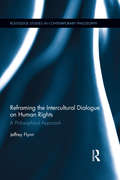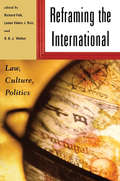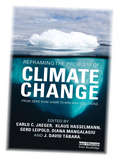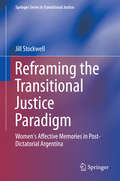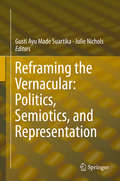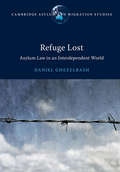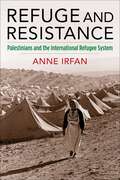- Table View
- List View
Reforms in Long-Term Care Policies in Europe
by Emmanuele Pavolini Costanzo RanciOver the last two decades, many changes have happened to the social welfare policies of various industrial countries. Citizens have seen their pensions, unemployment benefits, and general healthcare policies shrink as "belt tightening" measures are enforced. But in contrast, long-term care has seen a general growth in public financing, an expansion of beneficiaries, and, more generally, an attempt to define larger social responsibilities and related social rights. The aim of this book is to describe and interpret the changes introduced in long-term care policies in Western Europe. The volume argues that recent reforms have brought about an increasing convergence in LTC policies. Most of the new programs have developed a new general approach to long-term care, based on a better integration of social care and health care. The book explores increasing public support given to family care work (in the past, the family would take care of the elderly or infirm) and increasing growth and recognition of a extended social care market (by which care has shifted from a moral obligation based on family reciprocity to a paid, professional activity). A new social care arrangement has therefore been developing in Western countries, based on a new mix of family obligations, market provision, and public support. In order to understand such changes, this analysis will take into account the social and economical impact of these reforms.
Refounding Democracy through Intersectional Activism: How Progressive Era Feminists Redefined Who We Are, and What It Means Today (Intersectionality)
by Wendy SarvasyIn Refounding Democracy through Intersectional Activism, Wendy Sarvasy recovers the unacknowledged Progressive Era social democratic feminist refounders who used collective political agency to reshape the body politic. Through intersectional activism, or the bridging of different movements, the refounders, who include Ida Wells-Barnett, Rose Schneiderman, and Jane Addams, created an intersectional, social democratic feminist understanding of democracy that allowed them to imagine their full inclusion. Sarvasy shows how these activists worked to incorporate women by combining political democracy with the creation of a welfare state. They embedded this nation-state project within a new humanitarian transnational level as they evolved their multileveled social citizenship. Refounding Democracy through Intersectional Activism demonstrates how a theory-activist dynamic played out in experimental socializing spaces and democratic conversations. It offers an inspirational method for intersectional activists today.
Refracted Economies: Diamond Mining and Social Reproduction in the North
by Rebecca Jane HallSince the beginning of the twenty-first century, diamonds have been lauded as a "glistening" driver of the northern Canadian economy. Canadian diamonds are cast with an imagined purity as though they had emerged by magic. However, these diamonds are mined on Dene land and extracted by people who fly in from afar, separated from their families for long periods of time. Adopting a decolonizing and feminist approach to political economy, Refracted Economies analyses the impact of diamond mining in Yellowknife, Northwest Territories. The book centres on Indigenous women’s social reproduction labour – both at the mine sites and at sites of community, home, and care – as a means of understanding the diffuse impacts of the diamond mines. Grounded in ethnographic work, the narratives of northern Indigenous women’s multiple labours offer unique insight into the gendered ways northern land and livelihoods have been restructured by the diamond industry. Rebecca Jane Hall draws on documentary analysis, interviews, and talking circles in order to understand and appreciate the – often unseen – labour performed by Indigenous women. Placing this day-to-day labour at the heart of her analysis, Hall shows that it both reproduces the mixed economy and resists the gendered violence of settler colonialism as exemplified by extractive capitalism.
Refractions of Civil Society in Turkey
by Daniella KuzmanovicDrawing on data from ethnographic fieldwork among civic activists and identifying a range of domestic and international socio-political contexts, Refractions of Civil Society in Turkey explores different perceptions of civil society in Turkey and pursues the general question of why civil society holds such power to move those who evoke it.
Reframing Blackness and Black Solidarities through Anti-colonial and Decolonial Prisms
by George J. Sefa DeiThis book grounds particular struggles at the curious interface of skin, body, psyche, hegemonies and politics. Specifically, it adds to current [re]theorizations of Blackness, anti-Blackness and Black solidarities, through anti-colonial and decolonial prisms. The discussion challenges the reductionism of contemporary polity of Blackness in regards to capitalism/globalization, particularly when relegated to the colonial power and privileged experiences of settler. The book does so by arguing that this practice perpetuates procedures of violence and social injustice upon Black and African peoples. The book brings critical readings to Black racial identity, representation and politics informed by pertinent questions: What are the tools/frameworks Black peoples in Euro-American/Canadian contexts can deploy to forge community and solidarity, and to resist anti-Black racism and other social oppressions? What critical analytical tools can be developed to account for Black lived experiences, agency and resistance? What are the limits of the tools or frameworks for anti-racist, anti-colonial work? How do such critical tools or frameworks of Blackness and anti-Blackness assist in anti-racist and anti-colonial practice? The book provides new coordinates for collective and global mobilization by troubling the politics of "decolonizing solidarity" as pointing to new ways for forging critical friends and political workers. The book concludes by offering some important lessons for teaching and learning about Blackness and anti-Blackness confronting some contemporary issues of schooling and education in Euro-American contexts, and suggesting ways to foster dialogic and generative forums for such critical discussions.
Reframing Climate Change: Constructing ecological geopolitics
by Shannon O'Lear Simon Dalby"Change the system, not the climate" is a common slogan of climate change activists. Yet when this idea comes into the academic and policy realm, it is easy to see how climate change discourse frequently asks the wrong questions. Reframing Climate Change encourages social scientists, policy-makers, and graduate students to critically consider how climate change is framed in scientific, social, and political spheres. It proposes ecological geopolitics as a framework for understanding the extent to which climate change is a meaningful analytical focus, as well as the ways in which it can be detrimental, detracting attention from more productive lines of thought, research, and action. The volume draws from multiple perspectives and disciplines to cover a broad scope of climate change. Chapter topics range from climate science and security to climate justice and literacy. Although these familiar concepts are widely used by scholars and policy-makers, they are discussed here as frequently problematic when used as lenses through which to study climate change. Beyond merely reviewing current trends within these different approaches to climate change, the collection offers a thoughtful assessment of these approaches with an eye towards an overarching reconsideration of the current understanding of our relationship to climate change. Reframing Climate Change is an essential resource for students, policy-makers, and anyone interested in understanding more about this important topic. Who decides what the priorities are? Who benefits from these priorities, and what kinds of systems or actions are justified or hindered? The key contribution of the book is the outlining of ecological geopolitics as a different way of understanding human–environment relationships including and beyond climate change issues.
Reframing Education as a Public and Common Good: Enhancing Democratic Governance
by Rita LocatelliThis book examines the normative principles that guide the governance of education, in particular the notion of education as a public good. Determining whether this concept is still valid is a topic of growing importance, especially considering the phenomena of increasing privatisation and marketisation in the sector. The author posits that the prioritisation of economic aspects of education may lead to the weakening of the role of the State in ensuring equality of opportunity and social justice, and thus to a significant risk of considering education as merely a private, marketable good. The volume argues that considering education as a common good can lead to the strengthening of democratic and participatory approaches to educational governance, based on the recognition of education as a shared endeavour and responsibility. It will be of interest and value to students and scholars of education as a public good, social justice, and the wider neoliberalisation of the education sector.
Reframing Energy Access: Insights from The Gambia (Routledge Focus on Environment and Sustainability)
by Anne SchifferThis book investigates energy access through the lens of everyday energy practices in the Gambian community of Kartong. Reframing Energy Access: Insights from The Gambia explores past, current and potential future modes of energy production and consumption to examine concepts such as energy leapfrogging and energy sufficiency. It argues that developments must be rooted in situated understanding of energy consumption to ensure sustainable and equitable access to modern energy services. Schiffer provides a uniquely long-term and holistic perspective into changing energy practices on the ground and the economic, political, environmental, technical and cultural factors that shape it. Translating insights of energy in The Gambian context into broader themes and recommendations, this book will be of great interest to policy makers, researchers and practitioners who work in the fields of energy access, energy policy, renewable energy transitions, as well as African and sustainable development in general.
Reframing Europe's Future: Challenges and failures of the European construction (Routledge Advances in European Politics)
by Jody Jensen Ferenc MiszlivetzThe global financial crisis which erupted in 2008 had an astounding yet varied impact on the European Union (EU), with some countries benefiting from the crisis while others suffered. Today many more and varied voices articulate increasing frustration, dissatisfaction, distrust and cynicism with the current state of affairs in Europe. This book addresses the challenges and failures of the European construction today from an interdisciplinary perspective. It seeks to identify the deeper, structural causes of the failure of the European project by investigating a variety of aspects, placing Europe in a historical perspective and interpreting its trajectory in a global context. In doing so it argues that the EU, the unfinished European polity, the single European market, and the set of supranational institutions, are not sustainable in their present forms. This text will be of key interest to students and practitioners of international relations, economics, European studies, democracy and contemporary European and global challenges.
Reframing Global Social Policy: Social Investment for Sustainable and Inclusive Growth
by Christopher Deeming and Paul SmythChristopher Deeming and Paul Smyth together with internationally renowned contributors propose that the merging of the ‘social investment’ and ‘inclusive growth and development’ agendas is forging an unprecedented global social policy framework. The book shows how these key ideas together with the environmental imperative of ‘sustainability’ are shaping a new global development agenda. This framework opens the way to a truly global social policy discipline making it essential reading for those working in social and public policy, politics, economics and development as well geographical and environmental sciences. In the spirit of the UN’s Sustainability Goals, the book will assist all those seeking to forge a new policy consensus for the 21st century based on Social Investment for Inclusive Growth and Sustainable Development. Contributors include Giuliano Bonoli, Marius Busemeyer, Sarah Cook, Guillem López-Casasnovas, Anton Hemerijck, Stephan Klasen, Huck-ju Kwon, Tim Jackson, Jane Jenson, Jon Kvist, James Midgley, and Günther Schmid.
Reframing Italian Economic History, 1861–2021: Creative Destruction and the Italian Society (Palgrave Studies in Economic History)
by Nicola RossiThis book surveys the development of the Italian economy over the 150 years since unification, integrating economic analysis with an economic and social history of Italian society. The book challenges several key assumptions about the growth of the Italian economy, including the notion that Italy has ‘caught up’ with its main Western partners and arguing that in long-run perspective the Italian economy has performed disappointingly. In particular, the book highlights how the role of cultural values, beliefs and preferences are just as important as institutions and institutional change in explaining the trajectory of the economy, arguing that a widespread ‘growth-averse’ culture exists in Italian society that diverges from the dominant market paradigms of the Western world. Rather than treating the twenty years after WWII – the period of rapid growth known as Italy’s ‘economic miracle’ years – as an indicator of Italy’s success, the author analyses these years as an anomaly where capitalist processes like creative destruction and innovism were briefly permitted to flourish. The book draws out key questions, for example exploring why institutional reforms have not led to sustained rates of growth, and why other markers of quality of life have improved in Italy while economic performance has remained slow. This book will be a fascinating read for scholars of economics and economic history, as well as non-specialist readers looking for a comprehensive understanding of Italian socio-economic conditions since the country's unification.
Reframing Latin American Development (Routledge Critical Development Studies)
by Ronaldo Munck Raul Delgado WiseSince the year 2000 Latin America has been at the forefront of a series of diverse experiments with alternative forms, pathways and models of economic development and at the cutting edge of the international theoretical and political debates that surround these experiments. Reframing Latin American Development brings together leading scholars from Latin America and elsewhere to debate and discuss the current practice and futures of the Latin American experience with alternative forms of development over the last period and particularly since the end of neoliberal dominance. The models discussed range from the neo developmentalism approach of growth with equity, to the Buen Vivir (How to Live Well) philosophy advanced by the indigenous communities of the Andean highlands and implemented in the national development plans of the governments of Bolivia and Ecuador. Other models of alternative development include the so-called socialism of the twenty-first century and diverse proposals for constructing a social and solidarity economy and other models of local development based on the agency of community-based grassroots organizations and social movements. Reframing Latin American Development will be of particular interest to researchers, teachers and students in the fields of international development, Latin American studies and the economics, politics and sociology of development.
Reframing Migration, Diversity and the Arts: The Postmigrant Condition (Routledge Research in Art and Politics)
by Sten Pultz Moslund Moritz Schramm Anne Ring Petersen Mirjam Gebauer Hans Christian Post Sabrina Vitting-Seerup Frauke WiegandThis book offers a compelling study of contemporary developments in European migration studies and the representation of migration in the arts and cultural institutions. It introduces scholars and students to the new concept of ‘postmigration’, offering a review of the origin of the concept (in Berlin) and how it has taken on a variety of meanings and works in different ways within different national, cultural and disciplinary contexts. The authors explore postmigrant theory in relation to the visual arts, theater, film and literature as well as the representation of migration and cultural diversity in cultural institutions, offering case studies of postmigrant analyses of contemporary works of art from Europe (mainly Denmark, Germany and Great Britain).
Reframing Peace Mediation: Overcoming Negotiation Impasses in El Salvador (Routledge Studies in Peace and Conflict Resolution)
by Owen FrazerThis book explains how facilitative mediators, those without material leverage, contribute to progress in peace negotiations.While existing theories of mediation have offered suggestions about what a mediator should get parties to do to reach an agreement, the puzzle that has remained is: how does a mediator get parties to do what is prescribed? The book argues that a communication perspective is key to understanding facilitative mediation and that framing is the main mechanism by which facilitative mediation functions. Based on an empirical analysis of the United Nations mediation in El Salvador between 1990 and 1992, the work breaks new ground by uncovering three underlying mechanisms that explain how a mediator can get their framing adopted by the negotiating parties, thereby advancing the negotiations. The book offers a novel theory of facilitative mediation as framing and an innovative methodological approach that focuses on negotiation impasses to study the process of how negotiations progress. Practitioners will also appreciate the framework for thinking about when and how framing and reframing can be used to increase mediation’s effectiveness as a tool for ending armed conflict.This book will be of much interest to students of peace and conflict studies, negotiation, Latin American politics, and International Relations, as well as practitioners.
Reframing Politics in the Hebrew Bible: A New Introduction with Readings
by Mira MorgensternInspired by the Enlightenment readings of Hebrew biblical texts generated in the seventeenth through the nineteenth centuries, Mira Morgenstern's Reframing Politics in the Hebrew Bible goes beyond the pioneering interpretations of various biblical texts penned by such noted Bible students as Spinoza, Rousseau, and Angelina Grimké to present an introduction to the Hebrew Bible as a whole from the perspective of a modern-day political theorist. In doing so, it offers a brilliant thematic guide to the Hebrew Bible's most politically salient passages, complete with text and commentary. Morgenstern's account of the significance of these ancient yet strangely modern texts will fascinate students of both ancient and modern political theory—as well as all readers of the Hebrew Bible itself.
Reframing the Buffer State in Contemporary International Relations: Nepal’s Relations with India and China (Rethinking Asia and International Relations)
by Bibek ChandThis book explores buffer states' agency beyond being highly interactive spaces for the competing strategic and security interests of larger powers. Analyzing 21 political events, the author offers a new conceptual framework for the buffer state, which emphasizes strategic utility and agency. Applying this to the case study of Nepal as a buffer state between India and China, he offers a systematic analysis of Sino-Indian interests in the wider region, and Nepal’s interactions with and reactions to them, and argues that the buffer state in contemporary international relations is characterized by intense competitive overtures from its contending neighboring states. However, the buffer state is not just a spectator but an active participant that consistently assesses and reassesses its geopolitical position in between much larger competing powers. This reading offers a new understanding of the buffer state as a highly dynamic political space wherein the levels of influence and strategies of bigger powers can be examined. Aimed at a multidisciplinary audience, this book will be of particular interest to scholars, practitioners and students of international relations, security studies, strategic studies, and Asian Studies.
Reframing the Civic University: An Agenda for Impact (Rethinking University-Community Policy Connections)
by Julian Dobson Ed FerrariThis book addresses the need for a comprehensive reappraisal of what it means to be a ‘civic university’. For two decades the ‘civic’ agenda has been driven by a concern with economic impact and regional economic development. While recognising the importance of these aspects of universities’ civic influence, there is a need to more comprehensively outline how universities can and should make a difference across a wide spectrum of place-based activity, against a background of intensifying global social and environmental challenges. Rooted in collaborative work by the Civic University Network and community-based partners, the book provides a clear logical framework that universities and their partners can use to examine the extent of their civic activities, but also challenges them to use that framework as a starting point for deeper reflection and engagement. It celebrates the actions universities have taken to respond to communities’ needs, and encourages them to think more rigorously about what they can do in the future, and how they can become more accountable to the communities they serve. The book is an essential read for university leaders, academics involved in public engagement, and civic leaders and representatives who wish to develop closer engagement with their local universities.
Reframing the Feudal Revolution
by Charles WestThe profound changes that took place between 800 and 1100 in the transition from Carolingian to post-Carolingian Europe have long been the subject of vigorous historical controversy. Looking beyond the notion of a 'Feudal Revolution', this book reveals that a radical shift in the patterns of social organisation did occur in this period, but as a continuation of processes unleashed by Carolingian reform, rather than Carolingian political failure. Focusing on the Frankish lands between the rivers Marne and Moselle, Charles West explores the full range of available evidence, including letters, chronicles, estate documents, archaeological excavations and liturgical treatises, to track documentary and social change. He shows how Carolingian reforms worked to formalise interaction across the entire social spectrum, and that the new political and social formations apparent from the later eleventh century should be seen as long-term consequence of this process.
Reframing the Intercultural Dialogue on Human Rights: A Philosophical Approach (Routledge Studies in Contemporary Philosophy)
by Jeffrey FlynnIn this book, Flynn stresses the vital role of intercultural dialogue in developing a non-ethnocentric conception of human rights. He argues that Jürgen Habermas’s discourse theory provides both the best framework for such dialogue and a much-needed middle path between philosophical approaches that derive human rights from a single foundational source and those that support multiple foundations for human rights (Charles Taylor, John Rawls, and various Rawlsians). By analyzing the historical and political context for debates over the compatibility of human rights with Christianity, Islam, and "Asian Values," Flynn develops a philosophical approach that is continuous with and a critical reflection on the intercultural dialogue on human rights. He reframes the dialogue by situating it in relation to the globalization of modern institutions and by arguing that such dialogue must address issues like the legacy of colonialism and global inequality while also being attuned to actual political struggles for human rights.
Reframing the International: Law, Culture, Politics
by Richard Falk Lester Edwin J. Ruiz R. B. J. WalkerRe-Framing the International insists that, if we are to properly face the challenges of the coming century, we need to re-examine international politics and development through the prism of ethics and morality. International relations must now contend with a widening circle of participants reflecting the diversity and uneveness of status, memory, gender, race, culture and class.
Reframing the Problem of Climate Change: From Zero Sum Game to Win-Win Solutions
by Carlo Jaeger Klaus Hasselmann Gerd Leipold Diana Mangalagiu Joan David TàbaraThis book provides an evaluation of the science and policy debates on climate change and offers a reframing of the challenges they pose, as understood by key international experts and players in the field. It also gives an important and original perspective on interpreting climate action and provides compelling evidence of the weakness of arguments that frame climate policy as a win-or-lose situation. At the same time, the book goes beyond providing yet another description of climate change trends and policy processes. Its goal is to make available, in a series of in-depth reflections and insights by key international figures representing science, business, finance and civil society, what is really needed to link knowledge to action. Different contributions convincingly show that it is time – and possible – to reframe the climate debate in a completely new light, perhaps as a system transformative attractor for new green growth, sustainable development, and technological innovation. Reframing the Problem of Climate Change reflects a deep belief that dealing with climate change does not have to be a zero sum game, with winners and losers. The contributors argue that our societies can learn to respond to the challenge it presents and avoid both human suffering and large scale destruction of ecosystems; and that this does not necessarily require economic sacrifice. Therefore, it is vital reading for students, academics and policy makers involved in the debate surrounding climate change.
Reframing the Transitional Justice Paradigm
by Jill StockwellThis volume explores the evolving and complex memorial consequences of state-sponsored violence in post-dictatorial Argentina. Specifically, it looks at the power and significance of personal emotions and affects in shaping memorial culture. This volume contends that we need to look beyond political and ideological contestations to a deeper level of how memorial cultures are formed and sustained. It argues that we cannot account for the politics of memory in modern-day Argentina without acknowledging and exploring the role played by individual emotions and affects in generating and shaping collective emotions and affects. Drawing from direct testimony from Argentinian women who have experienced political and physical violence, the research in this volume aims at understanding how their memories may be a different source of insight into the deep animosities within and between Argentine memorial cultures. In direct contrast to the nominally objective and universalist sensibility that traditionally has driven transitional justice endeavours, this volume examines how affective memories of trauma are a potentially disruptive power within the reconciliation paradigm--and thus affect should be taken into account when considering transitional justice. Accordingly, Cultures of Remembrance for Women in Post-Dictatorial Argentina is an excellent resource for those interested in human rights, transitional justice, clinical psychology and social work, and Latin American conflicts.
Reframing the Vernacular: Politics, Semiotics, and Representation
by Gusti Ayu Made Suartika Julie NicholsThe aim of this book is to reflect on ''vernacularity'' and culture. It concentrates on two major domains: first it attempts to reframe our understanding of vernacularity by addressing the subject in the context of globalisation, cross-disciplinarity, and development, and second, it discusses the phenomenon of how vernacularity has been treated, used, employed, manipulated, practiced, maintained, learned, reconstructed, preserved and conserved, at the level of individual and community experience. Scholars from a wide variety of knowledge fields have participated in enriching and engaging discussions, as to how both domains can be addressed. To expedite these aims, this book adopts the theme "Reframing the Vernacular: Politics, Semiotics, and Representation",organised around the following major sub-themes: • Transformation in the vernacular built environment • Vernacular architecture and representation • The meaning of home • Symbolic intervention and interpretation of vernacularity • The semiotics of place • The politics of ethnicity and settlement • Global tourism and its impacts on vernacular settlement • Vernacular built form and aesthetics • Technology and construction in vernacular built forms • Vernacular language - writing and oral traditions
Refuge Lost: Asylum Law in an Interdependent World (Cambridge Asylum and Migration Studies)
by Daniel GhezelbashAs Europe deals with a so-called 'refugee crisis', Australia's harsh border control policies have been suggested as a possible model for Europe to copy. Key measures of this system such as long-term mandatory detention, intercepting and turning boats around at sea, and the extraterritorial processing of asylum claims were actually used in the United States long before they were adopted in Australia. The book examines the process through which these policies spread between the United States and Australia and the way the courts in each jurisdiction have dealt with the measures. Daniel Ghezelbash's innovative interdisciplinary analysis shows how policies and practices that 'work' in one country might not work in another. This timely book is a must-read for those interested in preserving the institution of asylum in a volatile international and domestic political climate.
Refuge and Resistance: Palestinians and the International Refugee System (Columbia Studies in International and Global History)
by Anne IrfanIn the decades after World War II, the United Nations established a global refugee regime that became central to the lives of displaced people around the world. This regime has exerted particular authority over Palestinian refugees, who are served by a specialized UN body, the Relief and Works Agency (UNRWA). Formed shortly after the 1948 war, UNRWA continues to provide quasi-state services such as education and health care to Palestinian refugee communities in the Middle East today.This book is a groundbreaking international history of Palestinian refugee politics. Anne Irfan traces the history and politics of UNRWA’s interactions with Palestinian communities, particularly in the refugee camps where it functioned as a surrogate state. She shows how Palestinian refugees invoked internationalist norms to demand their political rights while resisting the UN’s categorization of their plight as an apolitical humanitarian issue. Refuge and Resistance foregrounds how nonelite activism shaped the Palestinian campaign for international recognition, showing that engagement with world politics was driven as much by the refugee grass roots as by the upper echelons of the Palestine Liberation Organization. It demonstrates that refugee groups are important actors in global politics, not simply aid recipients.Recasting modern Palestinian history through the lens of refugee camps and communities, Refuge and Resistance offers vital new perspectives for understanding politics beyond the nation-state.
